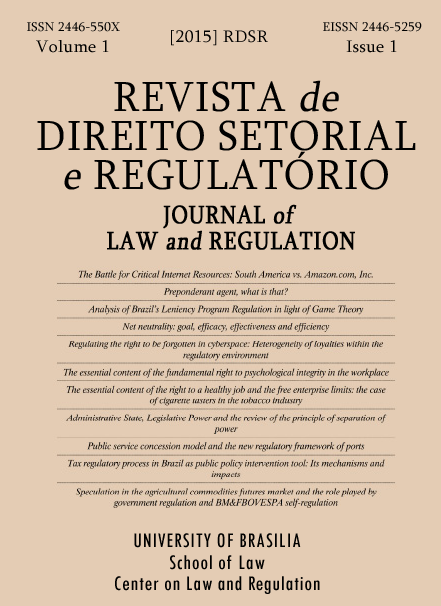Analysis of Brazil’s Leniency Program Regulation in light of Game Theory
Palabras clave:
leniency program, game theory, prisoner's dilemma, Brazil's regulation, benchmarkingResumen
Purpose ”“ This paper purpose is to evaluate, in the light of prescriptions of the Game Theory codified in the prisoner’s dilemma, if the regulation of the Brazilian Leniency Program is coherent with the intention of obtaining a greater number of confessions.
Methodology/approach/design ”“ The approach of the article consists in performing a critical analysis of the literature about the aforementioned topic, by establishing recommendations for the design of a program of leniency that increases number of confessions. It also compares each recommendation with the Brazilian program in order to verify if they are incorporated in it.
Findings ”“ It was found that the Brazilian Leniency Program has a high degree of adherence with the basic recommendations of game theory.
Practical implications ”“ The article leads to further steps on the evaluation of the empirical results of the practical application of the leniency program in the last decade and may serve as reference to similar regulation programs in other areas besides antitrust.
Originality/value ”“ The text is an attempt to analyze more minutely a tool of investigation that has been essential to shield competition in Brazil. Furthermore, findings on this investigative procedure add perspective to similar tools recently introduced in Brazil’s legal framework.
Descargas
Citas
BOS, Iwan; WANDSCHNEIDER, Frederik. Cartel Ringleaders and the Corporate Leniency Program. Optimal corporate leniency program. CCP Working Paper 11-13. Disponível em: http://ssrn.com/abstract=1910000. Acesso em: dezembro de 2014.
FEHR, Ernst; FISCHBACHER, Urs. The nature of human altruism. Nature, Zurique, v. 425, p.785-791, 23 de outubro de 2003.
GABAN, Eduardo M.; DOMINGUES, Juliana O. Direito Antitruste. 3ª Ed. São Paulo: Saraiva, 2012.
HAMMOND, Scott D. Cornerstones of an Effective Leniency Program. Chile: Santiago, 9 set. 2009. Apresentado por ocasião do “Chilean Competition Day”.
HARRINGTON, Joseph E.. Optimal corporate leniency program. Working papers, The Johns Hopkins University, Department of Economics, n. 527, 2005.
HOVENKAMP, Herbert. Federal Antitrust Policy ”“ The Law of Competition and its Practice. 4ª ed. St. Paul, MN: Thomson Reuters, 2011.
JESUS, Damásio E. de. Estágio atual da “delação premiada” no Direito Penal brasileiro. Jus Navigandi, ano 10, n. 854, 4 de novembro de 2005.
LESLIE, Cristopher R. Antitrust Amnesty, Game Theory, and Cartel Stability. Journal of Corporation Law, vol. 31, p. 453-488, 2006.
MARTINEZ, Ana P. Repressão a Cartéis ”“ Interface entre Direito Administrativo e Direito Penal. São Paulo: Singular, 2013.
SPAGNOLO, Giancarlo. Divide et Impera: Optimal Leniency Programs. Suécia: Stocolmo, 12 de janeiro de 2005. Stockholm School of Economics Consio Spa, and C.E.P.R.
_____. Leniency and Whistleblowers in Antitrust. Itália: Roma, 23 de junho de 2005. Preparado para a Conferência LEAR “Advances in the Economics of Competition Law”. Disponível em: http://ssrn.com/abstract=936400. Acesso em: dezembro de 2014.
SPRATLING, Gary R. Making Companies an Offer They Shouldn’t Refuse. Washington, D.C., 16 de fevereiro de 1999. Apresentado no 35º simpósio sobre antitruste da American Bar Association.
Descargas
Publicado
Cómo citar
Número
Sección
Licencia
Al enviar este documento a la Revista de Derecho, Estado y Telecomunicaciones, declaro que estoy aceptando los términos de Creative Commons Attribution 4.0 International (CC BY 4.0), disponible en http://creativecommons.org/licenses/by/4.0.


